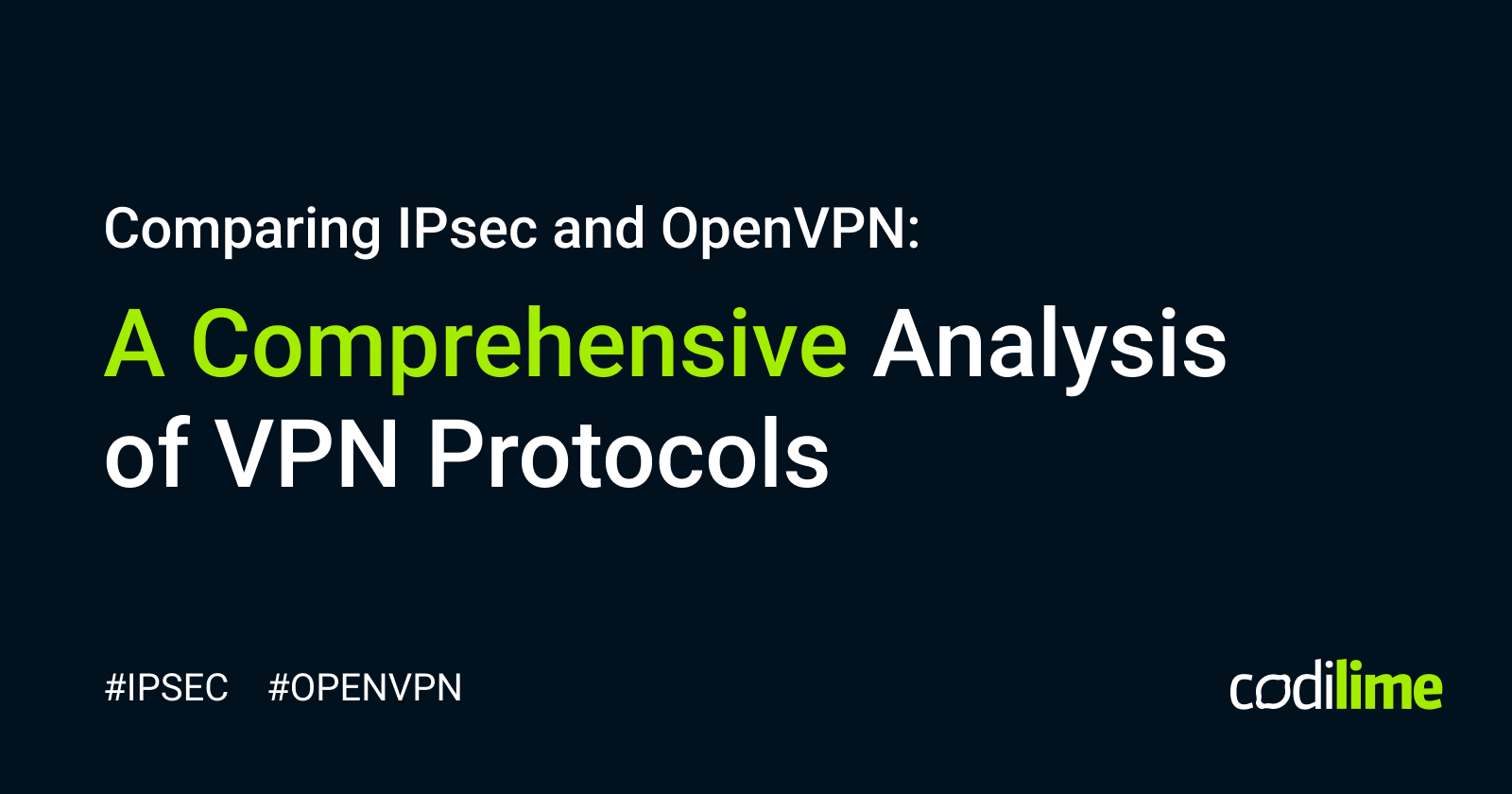Comparing IPsec and OpenVPN: A Comprehensive Analysis of VPN Protocols
 CodiLime
CodiLimeTable of contents
- Unraveling the World of VPNs
- Deciphering OpenVPN: A Brief Look
- Peering into IPsec: A Deeper Insight
- Parsing the Variances: Distinctions between OpenVPN and IPsec
- Essential Differences: A Comparative Assessment
- The Pros and Cons Unveiled
- The Benefits of IPsec and OpenVPN
- Exploring the Drawbacks: IPsec and OpenVPN
- WireGuard: A Viable Alternative for IPsec and OpenVPN?
- Exploring Hybrid Solutions and Concluding Insights

In the realm of VPNs, references to IPsec and OpenVPN are ubiquitous, however the choice between the two is not an either-or decision and both can be used simultaneously, depending on the purpose and need. But how does one decide which protocol aligns better with the current needs? This article aims to explore the dissimilarities between OpenVPN and IPsec, dissecting their nuances, strengths, and weaknesses.
Unraveling the World of VPNs
A virtual private network (VPN) serves as an enhanced communication channel that passes through both trusted private networks and more insecure public networks. A hallmark of VPNs in most cases is the skillful use of encryption techniques (excluding solutions like L2VPN or EVPN) that strengthen connections against the threats of eavesdropping and data manipulation during transmission, particularly over sensitive areas of the internet. VPNs can connect geographically dispersed networks, almost as if they were directly linked.
Solutions like IPsec or OpenVPN don’t require complex reconfiguration of external network devices for seamless communication. Imagine VPNs as virtual channels connecting different devices or remote locations. For example, VPNs facilitate remote employee access to a company's digital assets, establish secure communication channels between different branches of a company, and even support connectivity to private networks of other companies.
It is important to underscore that this article delves into the realm of encrypted VPN protocols.
Deciphering OpenVPN: A Brief Look
OpenVPN emerges as a quintessential example of a VPN protocol, using an open-source framework that can be integrated into software suites compatible with popular operating systems. It finds its prime utility in client-to-site connections, serving as the conduit through which remote employees access organizational resources.
Peering into IPsec: A Deeper Insight
IPsec is short for Internet Protocol Security. It makes data safe by encrypting it before sending over a network. In particular, IPsec extends its protective cloak to ensure data integrity by scrupulously checking that the data in transit remains unaltered and uncorrupted. IPsec's versatility shines through its competence in handling data authentication at the network layer and securing multiple concurrent data streams.
Additionally, IPsec boasts an anti-replay mechanism, which effectively identifies and rejects replayed data packets. It is imperative to emphasize that IPsec primarily thrives in site-to-site connectivity scenarios, serving as the linchpin that facilitates communication across different branches of an organization.
You can learn more on the subject by reading the article “IPSec—what is it and how does it work?”
Parsing the Variances: Distinctions between OpenVPN and IPsec
Although the overarching objective of both OpenVPN and IPsec pertains to data security, an array of nuanced distinctions sets them apart.
Essential Differences: A Comparative Assessment
Discerning observers will note these pivotal differences, each shaping the protocol's unique characteristics:
Installation Complexity: The installation of OpenVPN necessitates additional software, a component not typically found pre-installed in operating systems. In stark contrast, IPsec enjoys direct integration into a wide spectrum of operating systems and network devices.
Security Parameters: OpenVPN garners acclaim for its limited vulnerability exposure, often being hailed as the gold standard of secure protocols. Noteworthy is OpenVPN's provision of multiple cipher suites, a feature that encompasses established choices like AES, as well as contemporary options such as ChaCha. This protocol furnishes the user with the liberty to select a tunneling protocol, including support to revered standards like TLS 1.3.
On the other hand, IPsec, specifically when paired with IKE, offers a parallel ability to choose from a range of cipher suites, although the gamut may not be as extensive when compared with OpenVPN. The relatively narrower spectrum can be attributed to the frequent hardware acceleration of IPsec, particularly on network devices like firewalls, resulting in heightened performance but at the cost of limiting the available encryption protocols.
Navigating Firewall Configurations - Ports: OpenVPN, distinguished by its capacity to operate on a designated UDP or TCP port, allows for heightened flexibility in configuring connections. Conversely, IPsec employs predetermined communication channels, specifically UDP 500 (IKE) and UDP 4500 (NAT traversal), to initiate the encrypted tunnel, complemented by ESP (Encapsulating Security Payload) for the secure transmission of encrypted data.
The Pros and Cons Unveiled
Distinct advantages and corresponding disadvantages emanate from these defining differences. A comprehensive exploration of these facets is imperative.
The Benefits of IPsec and OpenVPN
IPsec is appealing for multiple reasons. It smoothly fits into firewalls and routers without requiring any changes to user or server systems, demonstrating its strength. Moreover, IPsec's common preinstallation within user systems stands as a tangible advantage, especially in scenarios involving remote employees lacking the prerogative to install software on their devices.
OpenVPN's strengths lie in its formidable encryption prowess, hinged upon 256-bit encryption keys and advanced ciphers. A remarkable attribute of OpenVPN lies in its ability to effortlessly traverse firewalls, leveraging any port on either TCP or UDP. This makes it possible that connections going through OpenVPN look like HTTPS traffic, efficiently bypassing standard ACLs (however it will block such a traffic when NGFW is in use).
OpenVPN's software is available for free (OpenVPN community project), although a paid version named OpenVPN Access Server has gained prominence. Notably, in cases of disconnection, OpenVPN supports adaptive reactions, temporarily pausing network activity until restoration of connectivity or reconfiguration of the network. Another option is to maintain only inner company traffic (depending on the configuration).
Exploring the Drawbacks: IPsec and OpenVPN
However, every solution has its limitations. Both IPsec and OpenVPN exhibit their respective limitations.
Cons Associated with IPsec
While IPsec stands as a venerable and widely adopted protocol, its encrypted tunnel setup demands meticulous configuration of multiple parameters. This intricacy could potentially overwhelm novice users. Troubleshooting IPsec-related issues often entails sifting through a plethora of logs riddled with complex terminology, adding an additional layer of challenge.
Additionally, while IPSec has good support for client-to-site connectivity, it is not as flexible as OpenVPN. It may not match the flexibility offered by OpenVPN, particularly in scenarios necessitating dynamic configurations.
Analyzing OpenVPN's Limitations
Similar to IPsec, OpenVPN's configuration process can prove demanding and intricate, necessitating familiarity with an array of manual settings and diverse configuration options. An inappropriate setup could inadvertently lead to more harm than benefit. Consequently, OpenVPN might be perceived as less user-friendly, particularly for individuals less well-versed in technical intricacies - when we consider a server-side scenario. Notably, OpenVPN is not preinstalled on any operating system, which mandates the configuration of third-party software.
WireGuard: A Viable Alternative for IPsec and OpenVPN?
Should neither OpenVPN nor IPsec resonate as the ideal solution, an alternative contender emerges: WireGuard. Noted for its streamlined implementation, robust security, cross-platform compatibility, and commendable performance, WireGuard presents an appealing choice for those seeking swift and secure connections. However, WireGuard's drawback lies in its limited configuration options, which might not align optimally with complex enterprise environments.
Explore more similarities and differences in an article about IPSec vs. OpenVPN.
Exploring Hybrid Solutions and Concluding Insights
As the discourse concludes, it's crucial to acknowledge hybrid alternatives like SoftEther, boasting support for multiple tunneling protocols, and other commercial client-to-site solutions tailor-made for specific contexts.
The crux of the matter remains that IPsec is often the preferred choice for site-to-site connections, effectively bridging network devices—predominantly firewalls—and enabling secure communication between diverse branches of an organization. Contrarily, OpenVPN takes the spotlight in client-to-site scenarios, facilitating remote access for users to their company's resources. Moreover, for those valuing quick and easily-configured encryption, WireGuard stands out, though it's important to note its limited configurability.
In summary, this article refrains from presenting an unequivocal "right" choice. Instead, its aim is to provide a comprehensive panorama of these two solutions, underscoring their merits and demerits, thereby empowering readers to make astute and well-informed decisions aligned with their unique prerequisites.
Subscribe to my newsletter
Read articles from CodiLime directly inside your inbox. Subscribe to the newsletter, and don't miss out.
Written by

CodiLime
CodiLime
We combine networking expertise with strong software engineering skills to help our clients seamlessly navigate the entire software product lifecycle, from design and development, through integration with a third-party stack, to deployment in a production environment, and further maintenance.